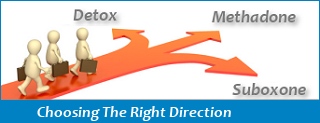|
Feel better … and live your life again! For those suffering with an opiate dependency, methadone treatment may become an important next step in your personal recovery. Methadone information for patients.
Most methadone program clients are happy to discover that their daily struggle with opiate withdrawal comes to an end. This provides a sense of relief that is enormously valuable. No doubt, someone in your life may be critical of your decision to utilize methadone. This judgment almost always comes from another individual's lack of education on addiction and their inability to relate to the struggle that you have been experiencing. Thankfully, family and friends often change their attitude toward methadone treatment once they see the dramatic relief & improvement that their loved one experiences. In time, others come to understand that addiction is a treatable illness. And that this illness can be managed successfully just like diabetes or heart disease. Methadone medication becomes a part of this health management approach.
What is a methadone treatment clinic like? Most all clinics maintain a staff consisting of a physician, nurses, counselors, receptionist, and possibly a financial specialist. These professionals work together to provide the methadone treatment program and to oversee its daily operation. Each clinic sets its own hours and fees. Each methadone clinic, whether private or publicly funded, must now maintain accreditation with an independent body such as CARF (Commission on Accreditation of Rehabilitation Facilities). All clinics are subject to regulation by both State and Federal authorities in order to serve the public.
What happens at my first appointment? Your first appointment is usually a screening appointment in which you will meet with a nurse or counselor to talk about your addiction problem and whether methadone treatment is a good fit for you. The professional will ask you questions about your opiate use history and related issues. He or she will also tell you about the methadone treatment program, and review some of the program's goals and guidelines. You are free to ask questions during this appointment.
Paying for your methadone treatment is also addressed in the first appointment. Payment options vary considerably from clinic to clinic. So be sure to talk this over with the program staff.
What happens when I am admitted? Being admitted to a methadone treatment program entails a clinical/medical evaluation and ultimately the signature of the methadone program physician. These activities are often completed in a single morning, but may be spread over two separate appointments depending on the schedule & availability of the methadone program staff. The clinical evaluation reviews your drug use history, its effects on your life, the presence of any co-occurring disorders like depression, and involves other tasks like signing consent forms and obtaining personal data such as your name, address, and phone number. The medical evaluation explores your health history, your current general health, any special medication needs you may have, and verifies your readiness to receive methadone medication. A physical exam is also provided. Once the doctor signs for you to receive methadone, then you will be given your first dose.
The typical procedure for dosing is to first check-in with the program receptionist. Next, you will see the nurse to obtain your methadone dose. How long you wait to dose varies from clinic to clinic, and depends on the size of the clinic and how many clients the clinic serves. Occasionally, program staff may need to meet with you for counseling sessions, urinalysis testing, or other purposes. Most of the time, you will dose and leave within a matter of minutes.
What is the induction period? Induction is a term used to describe the process of providing you with methadone medication and adjusting the dosage gradually over time to help you achieve comfortable stabilization. You will work closely with your clinic's medical staff during the induction period. Clinics routinely begin clients on a lower dose of methadone and then increase the dosage slowly every few days. This is an important safety measure to help you get adjusted to the proper amount of medication that will be effective for you. The induction period may last for several weeks. Since methadone is a powerful medication with slower onset & longer duration than most opioids, the medical staff should carefully monitor your response to methadone during the induction period to minimize any potential risk of overdose.
What is take home medication? Once a client has made progress with treatment and shown that they are stable, they may become eligible to receive methadone doses which can be taken home. This is convenient, and allows the client to skip coming to the clinic for their daily methadone dose. The program staff determine if a client is a good candidate for take home medication. This is considered a privilege, and is usually awarded one take home at a time. Additional take home doses may be awarded after further periods of progress & stability. Each clinic differs in how many take home doses they will award. Take home medication is only for those clients who are doing well in the recovery program. Having take home medication is an important responsibility, and is subject to careful monitoring by the methadone program staff. It is critical that methadone take home medication always be stored under lock & key, kept away from children, and never given to another individual.
Counseling itself may be offered as one-on-one individual sessions, family sessions, or group sessions. Each of these allow the client to develop improved skills and an improved quality of life. Some clients may stabilize very quickly after beginning a methadone program, while other clients may need more time to repair their lives and get things back on track. Counseling is provided to aid this process and to increase every client's chance of having a rewarding, drug-free life. Methadone programs are structured in phases such that clients may advance through phases as they demonstrate progress and make positive gains in their lives. Moving to higher phases usually results in the award of take home medication (meaning fewer trips to the clinic) and fewer counseling session requirements.
What if I want to discontinue methadone treatment? Most clients will eventually begin thinking about tapering off of methadone. There are different methods for successfully tapering off of methadone. The most successful strategy is the gradual taper. A gradual taper means that a client reduces their methadone dosage by several milligrams every week or so. For example, a client receiving a 60 mg dose each day may try reducing their dose 2 or 3 mg every week. This small decrease (spread over time) allows the body to adjust gradually to less methadone. Some clients may find that they can drop their dosage more frequently. Every client is different. Consequently, some experimentation is usually needed to see how you feel as you taper your dosage downward. It is very important to talk to your counselor and the dispensing nurse about your taper so that the team is working with you as you proceed with this goal. Please note that you can always stop your taper should you become uncomfortable, and you can even take you dose back up if you need to. The goal is to taper down as comfortably as possible without putting yourself at risk of opiate relapse. Gradual is the key to success. The program doctor and other members of the methadone treatment team are your most valuable resource in examining ways to taper successfully. |
"Methadone and Treatment
|


 If you are determined to be eligible for the methadone program, you may be invited to proceed that day with the intake process so that you may become a client. On the other hand, you may wish to take some time and think it over. This is fine too. If it is determined that you are a good candidate for the program, the staff person may need to schedule your intake for a later date depending on whether staff are available to complete your intake.
If you are determined to be eligible for the methadone program, you may be invited to proceed that day with the intake process so that you may become a client. On the other hand, you may wish to take some time and think it over. This is fine too. If it is determined that you are a good candidate for the program, the staff person may need to schedule your intake for a later date depending on whether staff are available to complete your intake. How, and when, will I receive methadone medication?
How, and when, will I receive methadone medication? What about counseling sessions?
What about counseling sessions?


